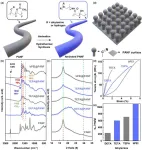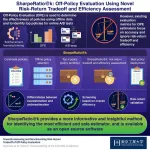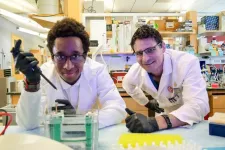(Press-News.org) Existing drugs studied in patients with rare immune diseases
This month the first study within the DRIMID consortium (DRIMID stands for Drug Rediscovery for Rare Immune Mediated Inflammatory Diseases) has started. This study will investigate the efficacy and safety of the drug filgotinib (approved for treatment of rheumatoid arthritis and ulcerative colitis) in three rare immune diseases (Behçet's disease, idiopathic inflammatory myositis, IgG4-related disease). DRIMID aims to investigate whether this drug - despite the absence of formal drug approval - can also be used to treat these rare immune diseases.
New drugs are usually developed (and therefore faster accessible) for conditions involving large patient groups. However, for rare diseases, drug development is more difficult. With the establishment of the DRIMID partnership, major steps have now been taken to make new drugs available to such patient groups. The project is a collaboration between ARCH foundation, ReumaNederland, drug company AlfaSigma and a number of Dutch hospitals with the aim of (re)developing drugs for rare disorders.
Rare immune diseases
Rare immune-mediated inflammatory diseases usually have an unknown cause, and are often associated with the formation of autoantibodies (the immune system attacks its own body). Examples of such diseases include granulomatosis with polyangiitis, inflammatory myositis, vasculitis of the great vessels, IgG4-related disease, Behçet's disease, Sjögren's disease and systemic sclerosis. A major problem in clinical practice is that many patients do not respond adequately to common anti-inflammatory drugs over time. Thus, there is an unmet medical need for adequate treatment options for this group.
The study
The aim of the study is to investigate if filgotinib is efficacious when used by patients with rare immune diseases and whether the drug is well tolerated. Now that the first study within the DRIMID framework has been approved by the medical ethics review committee, patients are being sought with one of the following rare immune diseases:
Behçet's disease
idiopathic inflammatory myositis
IgG4-related disease
It is important that participants have active symptoms of the disease at the start of the study. In addition, it is important that they have first tried regular treatment methods, such as prednisone and at least one other anti-inflammatory agent. If the disease did not or insufficiently respond to these drugs, or if the patient was hypersensitive to these drugs, the patient may be eligible for this new study.
The study will follow up patients for 26 weeks. At several points during the study, the effect of the drug on symptoms will be measured by a physician via physical examination, blood tests and questionnaires. If the drug appears to be working well for the patient at the end of the study, the patient will be allowed to continue taking it. Participation in the study is free of charge.
Participating hospitals
The study, coordinated by rheumatologist Prof. Jaap van Laar MD PhD (Department of Rheumatology & Clinical Immunology, UMC Utrecht), will start in six Dutch hospitals. Patients can be approached by their physician to participate, but they can also inquire about eligibility themselves. They can do so by sending an e-mail to reumatologie-research@umcutrecht.nl. The research nurse at UMC Utrecht will then contact the hospital most suitable for the patient. The study will be conducted at the following locations:
- UMC Utrecht
- Amsterdam UMC
- Erasmus MC (Rotterdam)
- Radboudumc (Nijmegen)
- Haga Hospital (The Hague)
- Zuyderland Medical Center (Heerlen)
DRIMID consortium
DRIMID is an acronym and stands for ‘Drug Rediscovery for Rare Immune Mediated Inflammatory Diseases’. ARCH (Arthritis Research and Collaboration Hub, a Dutch medical expertise platform for rare autoimmune diseases), ReumaNederland and UMC Utrecht (the first academic partner within DRIMID) established the public-private DRIMID consortium in 2021. The consortium is funded by ReumaNederland and Health Holland. In time, the investigators within the consortium intend to expand the project to other immune diseases and also to other drug companies and drugs.
END
Existing drugs studied in patients with rare immune diseases
2024-04-23
ELSE PRESS RELEASES FROM THIS DATE:
Loma Linda University study reveals alarming rates of pediatric injuries from mechanical bull riding
2024-04-23
A new study conducted by researchers at Loma Linda University Children’s Health has shed light on the alarming rates of pediatric injuries resulting from mechanical bull riding. The study, titled "Mechanical Bull Injuries in Pediatric Patients: A Call for Safety Regulations," highlights the urgent need for enhanced safety measures and regulations.
The findings were published in the journal Children's Health Care and revealed that mechanical bull riding poses a significant risk to children, with traumatic brain injuries being the most common outcome.
“Mechanical bulls, even when ...
Excessive pregnancy weight gain and substantial postpartum weight retention common in military health care beneficiaries
2024-04-23
ROCKVILLE, Md.— Compared to their civilian counterparts, excessive pregnancy weight gain is more frequent among military health care beneficiaries, in particular active duty personnel, and is associated with costly maternal/neonatal complications. Women in this sample with excessive pregnancy weight gain were also three times more likely to have substantial postpartum weight retention, according to a new study published in the journal Obesity, The Obesity Society’s (TOS) flagship journal.
Substantial weight retention ...
Odor-causing bacteria in armpits targeted using bacteriophage-derived lysin
2024-04-23
Body odor from the armpits comes from bacteria metabolizing sweat produced by the apocrine glands. These bacteria are native to our skin, but the odors produced differ among people. Generally, people use deodorants on their armpits, but perhaps there is a way to get rid of the bacteria.
To find out, a research team led by Osaka Metropolitan University Professor Satoshi Uematsu and Associate Professor Kosuke Fujimoto at the Graduate School of Medicine collected body fluid samples from the armpits of 20 men that were deemed healthy. In advance, a subjective olfactory panel classified ...
Women’s heart disease is underdiagnosed, but new machine learning models can help solve this problem
2024-04-23
When it comes to matters of the heart, cardiovascular disease in women is underdiagnosed compared to men. A popular scoring system used to estimate how likely a person is to develop a cardiovascular disease within the next 10 years is the Framingham Risk Score. It is based on factors including age, sex, cholesterol levels, and blood pressure.
Researchers in the US and the Netherlands have now used a large dataset to build more accurate cardiovascular risk models than the Framingham Risk Score. They also quantified the underdiagnosis of women compared to men. The results were published in Frontiers ...
Extracting high-purity gold from electrical and electronic waste
2024-04-23
Korea relies on imports for most of its metal resources, and in recent years, due to resource depletion and rising raw material prices, 'circular resources' that recycle waste metal resources have emerged. In response, SK hynix has established a mid- to long-term plan to increase the percentage of copper, gold, etc. recovered and reused from waste generated in the semiconductor manufacturing process to more than 30% by 2030, and Samsung Electronics is running a collection program for used mobile phones in cooperation with E-circulation Governance, a non-profit corporation. The global circular economy market is expected ...
Tropical fish are invading Australian ocean water
2024-04-23
A University of Adelaide study of shallow-water fish communities on rocky reefs in south-eastern Australia has found climate change is helping tropical fish species invade temperate Australian waters.
“The fish are travelling into these Australian ecosystems as larvae caught in the Eastern Australian Current, which is strengthening due to the warming climate,” said the University of Adelaide’s Professor Ivan Nagelkerken, Chief Investigator of the study.
“These larvae would not normally survive in the cooler Australian ...
No bull: How creating less-gassy cows could help fight climate change
2024-04-23
A Curtin University study has revealed breeding less-flatulent cows and restoring agricultural land could significantly reduce rising methane emission levels, which play a considerable role in climate change.
The food system, including grazing animals such as cows, generates major sources of methane mainly due to cattle digestion, manure decomposition and land use for grazing.
To look for solutions, researchers from the Curtin University Sustainability Policy Institute analysed 27 academic publications and identified dozens of potential strategies to reduce methane emissions from Australia’s beef and dairy sectors.
Study ...
ECU researchers call for enhanced research into common post-stroke condition
2024-04-23
Lateropulsion, a clinical condition which results in the body leaning to one side, affects about half of all stroke survivors.
Edith Cowan University (ECU) PhD graduate Dr Jessica Nolan said while the problem is common, lateropulsion is still severely under recognised and under assessed around the world.
“A person with lateropulsion uses the limbs on their stronger side, to push themselves over toward their weaker side. Often those with lateropulsion resist correction back towards their stronger ...
SharpeRatio@k: novel metric for evaluation of risk-return tradeoff in off-policy evaluation
2024-04-23
Reinforcement learning (RL) is a machine learning technique that trains software by mimicking the trial-and-error learning process of humans. It has demonstrated considerable success in many areas that involve sequential decision-making. However, training RL models with real-world online tests is often undesirable as it can be risky, time-consuming and, importantly, unethical. Thus, using offline datasets that are naturally collected through past operations is becoming increasingly popular for training and evaluating RL and bandit ...
$1.8M NIH grant will help researchers follow a virus on its path to the nucleus
2024-04-23
Researchers at the University of Arizona College of Medicine – Tucson were awarded a $1.8 million grant by the National Institute of General Medical Sciences, a division of the National Institutes of Health, to learn how human papillomavirus makes its way to a cell’s nucleus.
Human papillomavirus, or HPV, which can cause warts and certain cancers, has been with us since the dawn of humanity and causes about 5% of cancers worldwide. It also is an important source of information about human biology, according to Samuel K. Campos, PhD, an associate professor of immunobiology at the University of Arizona College of Medicine ...







